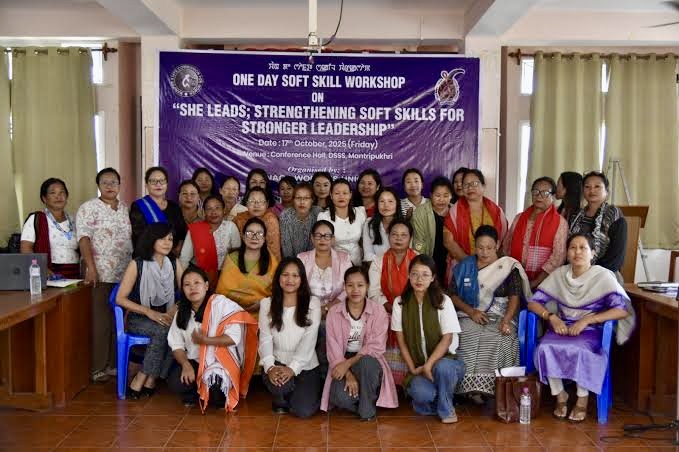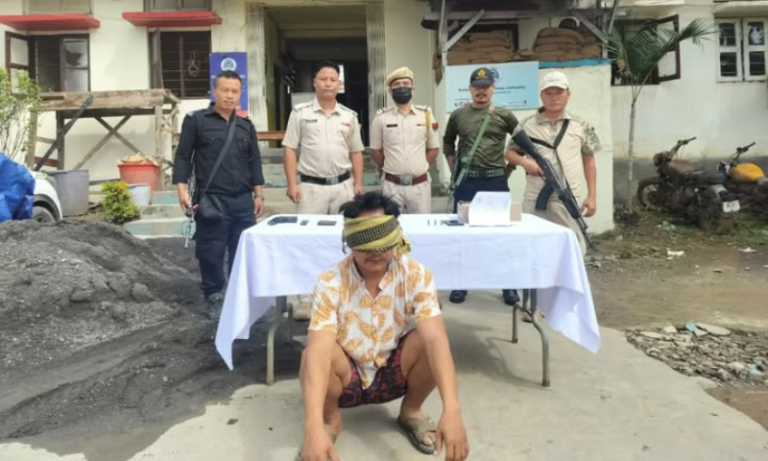Manipur: Naga Women Emphasize Soft Skills for Stronger Leadership
At a one-day workshop titled “She Leads: Strengthening Soft Skills for Stronger Leadership”, organized by the Naga Women’s Union (NWU) in collaboration with the Manipur State Commission for Women (MSCW), Naga women from about 20 different villages gathered in Imphal (Mantripukhri) to stress how essential soft skills like communication, empathy, adaptability, and teamwork are to effective leadership. The workshop’s speakers, including Th. Tiningpham Monsang (Chairperson, MSCW), encouraged each woman—regardless of formal education—to recognize her inherent leadership abilities, and to bring what she learns back to her village.
WHAT HAPPENED AT THE WORKSHOP
• Where & When: The Conference Hall in DSSS, Mantripukhri, Imphal; a one-day event.
• Who Organized: The Naga Women’s Union (NWU), in partnership with the Manipur State Commission for Women (MSCW).
• Who Attended: Women from different villages/districts — around 20 Naga villages represented. Leaders, community women, people who may or may not have formal authority but have influence in their communities.
• Theme: “She Leads: Strengthening Soft Skills for Stronger Leadership.” Focus was not on technical leadership or politics, but soft skills — what makes leadership humane, effective, inclusive: communication, empathy, adaptability, self-awareness, and collaboration.
Speakers (including Monsang, W. Phajatombi Devi, Sk. Sophia, etc.) made some key points:
• You don’t have to have a high degree or an elite position to lead. Every woman has leadership potential.
• Soft skills often go unseen or undervalued, but are what make teams work, retain trust, build community.
• It’s one thing to learn soft skills in a workshop; it’s another to practice them daily, to reflect, to keep learning.
Frequently Asked Questions
Q1: What exactly are “soft skills,” and why are they emphasized over technical skills in this context?
Soft skills are interpersonal, emotional, and relational abilities — communication, empathy, adaptability, listening, collaboration. In rural or community settings, technical skills (formal training, certificates) matter, but soft skills often determine whether leaders can connect with people, inspire trust, navigate conflicts, and sustain change. They are emphasized because many women already have technical or informal leadership roles but need tools to strengthen relational impact.
Q2: Who organized the workshop, and who participated?
The workshop was organized by the Naga Women’s Union (NWU), sponsored by the Manipur State Commission for Women (MSCW). Women from about 20 Naga villages and districts attended, including those who are informal leaders, community influencers, and those interested in developing leadership capacities.
Q3: What are the main challenges to developing soft skills among women in villages?
Challenges include cultural norms that discourage women from speaking up, lack of platforms to practice leadership, limited feedback and mentorship, lack of self-awareness, and resource constraints (travel, time, cost) to attend training. Also, soft skills are harder to measure and maintain without ongoing reinforcement.
Q4: How can women apply what they learn from workshops in their everyday life?
Many ways: start small in home settings (listening, negotiating, family discussions), in village meetings or women’s groups, lead local health or education initiatives, mentor younger girls, use communication tools (storytelling, active listening). The idea is practice + reflection: try, see what works, refine. Also, sharing learnings with peers helps.
Q5: What role can government and civil society play to sustain this leadership development?
They can organize periodic soft-skills training, create mentorship networks, include leadership development in local governance programs, support village-level forums and platforms, ensure women from remote areas are included (subsidies, travel support), and build evaluation mechanisms so programs improve over time.




